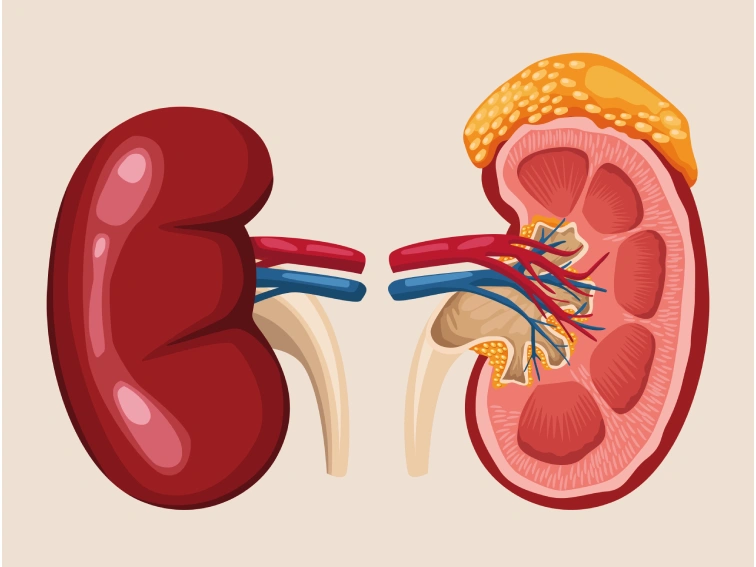Kidney disease and weak bones: One of the functions of your kidneys is to produce the hormone vitamin D.
It is a hormone that helps keep your bones healthy and strong by providing calcium to them.
Vitamin D helps to maintain calcium and phosphorus levels in the blood.
If your kidneys gradually slow down, fail or do not work properly, they cannot produce Vitamin D or maintain proper levels of minerals in the body.
This can make your bones weak and lead to fractures. This condition is called Renal Osteodystrophy.
Signs and Symptoms
Kidney disease and weak bones: The main symptoms are bone pain, fatigue, muscle weakness and bone fractures.
Which minerals and hormones are important for bone health?
The following minerals and hormones are important for healthy bones:
Calcium – Calcium makes your bones strong and also helps in nerves and muscles function. Kidneys help in maintaining calcium levels in the blood.
Phosphorus – It is a vital component of bones. Your kidneys maintain proper balance of phosphorus in the blood. Phosphorus levels increase during chronic kidney disease. It stimulates the production of parathyroid hormone.
Calcitriol (Vitamin D) – Kidneys make this hormone from vitamin D. It helps in calcium absorption and functioning of parathyroid glands.
Parathyroid hormone – This hormone helps in maintaining stable calcium levels in the blood. The levels of this hormone increase in chronic kidney disease owing to which calcium is removed from the bones making them weak.
Fibroblast growth factor (FGF) – This is a hormone (FGF23) produced in the bones. It controls phosphorus and vitamin D levels. The levels of this hormone increase in chronic kidney disease (CKD). Bones produce excess levels of this hormone in response to high phosphorus levels.
How is renal Osteodystrophy diagnosed?
Your nephrologist will order blood tests such as calcium, phosphorus, vitamin D and parathyroid hormone levels tests and imaging test to diagnose renal osteodystrophy. To assess structural changes in the bones, the doctor may order X-rays, CT scans and MRI scans. To measure bone density, DEXA scan is recommended.
Treatment
The treatment for renal osteodystrophy will mostly depend on the severity of kidney disease and the extent of bone damage. Your nephrologist may recommend dietary changes, Vitamin D and calcium supplements and medications.
Bottom Line
People with a pre-existing kidney disease with symptoms such as muscle weakness, bone and body pain should consult their nephrologist. Kidney disease progresses silently without causing any symptoms in the initial stages. In most cases, symptoms manifest in the advanced stages. Routine checkups with your nephrologist can help detect kidney disease and weak bones early.
If you have risk factors such as diabetes, high blood pressure, heart disease, excess body weight and a family history of kidney disease, then consult your nephrologist – which will help in the early detection of kidney disease.
If kidney disease is detected early, you can take steps working with your nephrologist to slow the progression of kidney disease.

Leave a Reply